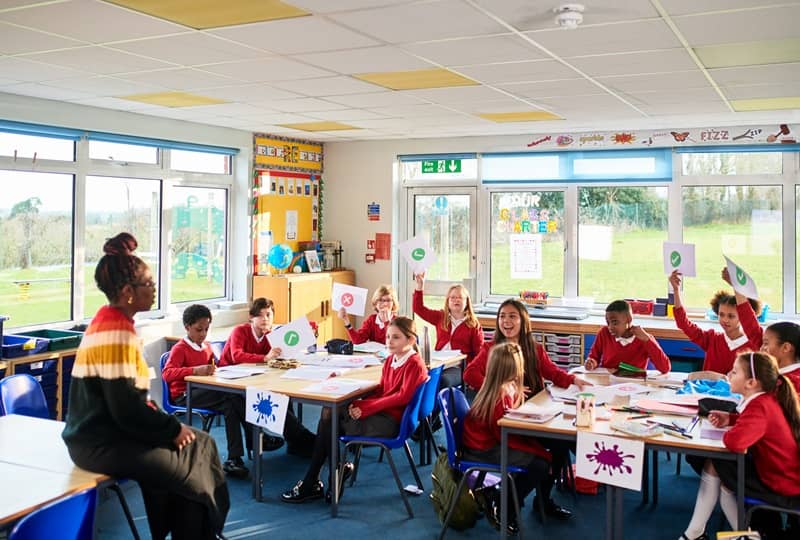Sometimes you miss the trees for the forest. Education reform debates tend to focus on how to get the maximum number of children minimally educated. But the focus of real-life parents is getting at least a minimum number of children (their own) maximally educated. These two goals shouldn’t be at odds. In fact, the second can drive the first―if more parents were empowered to make meaningful choices for their children’s education.
A Portland-area mothers club recently advertised a public forum for local parents: “…[A]re you…trying to find the right school? Attend the…Preschool Forum to find out what teaching philosophy, curriculum, and school is best for you and your child. Representatives from over 35 local schools will be on site to provide a brief overview of teaching styles [and] programs, and to answer questions.”
This advertisement is an example of the mindset of parents with the means to shop around for the educational environment that provides what they value. Families of greater financial means already have “school choice.” They might move to a district or neighborhood with a public school they like, or they might pay full tuition at a private or parochial school. However, those options are commonly out of the reach of lower-income families.
When Cascade Policy Institute started a privately funded scholarship program, the Children’s Scholarship Fund-Portland, we learned “hands-on” that lower-income parents share the same interest in their children’s education that middle- and upper-class parents do, and they are motivated to make the same kinds of choices on their behalf. For these parents, the stakes are high. A solid education is crucial for a successful adulthood and upward mobility, and that path begins in grade school. Like parents of greater means, lower-income parents also aspire to choose the “teaching philosophy, curriculum, and school” that is best for their child. But they usually find their children trapped in public schools that, for many reasons, do not meet their kids’ needs or do not meet standards that are important to their families.
In 1999, the national Children’s Scholarship Fund (CSF) offered dollar-for-dollar matching grants to independent local partner programs that would provide partial tuition assistance to low-income grade school children to attend the schools of their choice. Cascade Policy Institute was among the nonprofits which took up this unprecedented challenge, raising $1 million in local funds to start a $2 million local program, the Children’s Scholarship Fund-Portland. Since then, CSF and its partners have invested $483 million in private funding to help more than 130,000 children nationwide.
While they don’t have much discretionary income (the average CSF-Portland family income is $35,500), CSF families always must pay part of their tuition themselves (Portland parents pay $1,680 on average). This ensures that the scholarship remains a “hand up,” rather than a handout. Because they have “skin in the game,” CSF parents are motivated to choose schools carefully and to encourage their children to make the most of their opportunities. CSF parents are responsible for transportation and other logistics involved with school attendance, just like all private school parents. Despite the challenges involved, these families make it happen.
The private schools CSF students attend typically spend one-third to one-half what neighboring public schools spend per student (the average tuition for CSF-Portland students is $3,700 this year), with better results in terms of graduation rates and college attendance. However, the point of the CSF program is not to prove that private schools are better than public schools. Rather, CSF believes that parents are the primary educators of their children and have their interests at heart. When empowered with a modest amount of financial help (the average Portland scholarship award is $1,700), parents will invest their own money, time, effort, and discipline to obtain the kind of education they want for their kids.
CSF partner programs respect the decision-making processes of families and support parents in directing their children’s education. This very human, family-centered element is what sets parent-focused education reform efforts apart from other ways of addressing the failures of today’s public education system. No one can design a school system that meets every child’s needs. No statistical data analysis or bureaucratic goal setting can ensure that any particular child makes it to high school graduation, succeeds in college, or excels in a career. No school can be all things to all people―nor should it. But most parents, including low-income ones, are keenly aware of their own children’s needs, aptitudes, strengths, weaknesses, and interests.
“CSF has meant so much to our family,” wrote a Portland mother named Cynthia. “…[W]e often talk about what a blessing it has been for the kids to have attended private school….It was the foundation for their future. It formed their beliefs, goals, morals….It has meant so much more than I can actually express. Following the death of my husband when the kids were five, three, and eight months old, it is the reason they were able to attend private school.”
Top-down education reform focuses on what appears not to be working for large numbers of people—but keeps those people in the system while the problems are being “fixed.” School choice focuses on what is working across all kinds of schools―and favors empowering parents and students to choose among options they find attractive. Top-down approaches pour more money into a broken system. School choice programs achieve more satisfactory results with more modest amounts of money, because the dynamic is shifted in favor of the parent, not the system. Government-focused education reform analyzes the forest; school choice promotes the best interest of the trees. School choice programs like CSF-Portland prove that good things happen when parents are empowered to vote with their feet on behalf of their own kids.
Kathryn Hickok is Publications Director at Cascade Policy Institute and Director of the privately funded Children’s Scholarship Fund-Portland, which provides partial tuition scholarships to Oregon elementary students from lower-income families.











